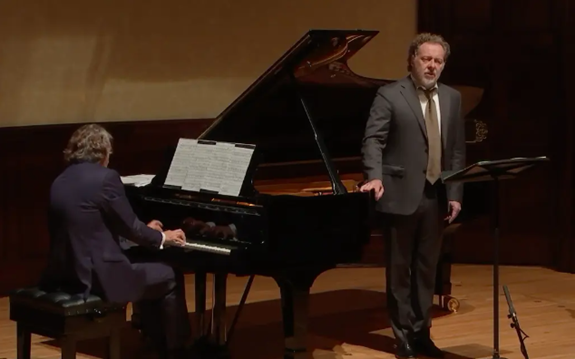 United Kingdom Tchaikovsky, Chopin, Pavel Haas, Berlioz: Christian Gerhaher (baritone), Gerold Huber (piano). Wigmore Hall, London, 20.1.2024. (CSa)
United Kingdom Tchaikovsky, Chopin, Pavel Haas, Berlioz: Christian Gerhaher (baritone), Gerold Huber (piano). Wigmore Hall, London, 20.1.2024. (CSa)

Fauré – ‘Le papillon et la fleur’, Op.1 No.1; ‘A Clymène’ from 5 mélodies ‘de Venise’, Op.58; ‘Les berceaux’, Op.23 No.1; ‘Spleen’, Op.51 No.3; ‘Danseuse; from Mirages, Op.113; ‘Clair de lune’, Op.46 No.2; ‘Notre amour’, Op.23 No.2
Tchaikovsky – ‘Again as before, alone’, Op.73 No.6; ‘Take my heart away’; ‘My genius, my angel my friend’; ‘Do not believe, my friend’, Op.6 No.1; ‘Cradle song’, Op.16 No.1; ‘The first meeting’, Op.63 No.4; ‘As over burning embers’, Op.25 No.2; ‘Not a word, O my friend’, Op.6 No.2
Chopin – Mazurka in A minor, Op.17 No.4; Mazurka in C-sharp minor, Op.30 No.4; Mazurka in E minor, Op.41 No.2; Ballade No.4 in F minor, Op.52
Haas – Four Songs on Chinese Poetry
Berlioz – Les nuits d’été, Op.7
Although appearances at Wigmore Hall by Munich-based baritone Christian Gerhaher and his long-time piano accompanist and former classmate Gerold Huber are not infrequent, they are red letter days for connoisseurs of the art song repertoire. In 2016, Gerhaher won the Wigmore Medal – awarded to musicians who have made a significant contribution to their art. A pupil of the late Dietrich Fischer-Dieskau, he combines a honeyed voice with flawless diction and a compelling gift for narrative, while Huber invariably proves a sentient and wonderfully intuitive partner.
Their latest offering consisted of a richly varied and intensely coloured compilation of songs by Fauré, Tchaikovsky, Berlioz, and Pavel Haas, interleaved with a selection of dazzling Chopin Mazurkas and the majestic Ballade No.4. This thoughtful programme provided Gerhaher not only with the opportunity to impress with his linguistic skills – whether singing in French, Russian or Czech – but also served to demonstrate the full breadth of his emotional range. It also allowed Huber to emerge from his supportive keyboard role to that of virtuoso soloist.
Opening with an intoxicating account of ‘Le Papillon et la fleur’ – a poem by Victor Hugo and the first of Fauré’s seven songs – Gerhaher moved with consummate ease from his resonant lower register to a light, liquid head voice, delicately conjuring the image of Hugo’s ‘heavenly butterfly’, flitting from flower to flower until borne away on a gentle breeze. He also caught perfectly that distinctively Gallic quality of sensual melancholy which pervades such songs as ‘A Clymène’, ‘Spleen’, and ‘Clair de lune’, all settings of poems by Paul Verlaine.
Fauré deeply admired and corresponded with his ‘master and friend’ Tchaikovsky, and it was a fascinating selection of eight rarely heard songs by Tchaikovsky which came next. These heartrending compositions were played and sung with the utmost sensitivity. Gerhaher’s tender account of ‘My genius, my angel, my friend’, and ‘Cradle song’ contrasted dramatically with almost operatic outbursts of Slavic grief and passion in ‘Do not believe, my friend’, while Huber’s extensive skills as a song pianist lent supportive voice to the expressive cadence of the Russian verse.
Doubtless Tchaikovsky would have had no objection to sharing a programme of his works with Fauré, but he may have felt less enthusiastic about appearing on the same bill as Chopin, in whom (according to one biographer) ‘he found a certain sickliness of expression as well as an excess of subjective sensibility’. Such reservations would surely have been dispelled by Huber’s fiery and uplifting performance of three of Chopin’s Mazurkas: those in A minor, Op.17 No.4, C-sharp minor, Op.30 No.4, and E minor, Op.41 No.2, each of which is a robust expression of resilience and optimism.
The second half began with Four Songs on Chinese Poetry by the Jewish Czech composer Pavel Haas, written in 1944 while imprisoned in Terezìn concentration camp, six months before he perished in the gas chambers of Auschwitz. Haas somehow found refuge in these achingly sad Tang Dynasty texts, full of yearning for home and loved ones. Two of the songs are set to fragments from the St. Wenceslaus Chorale, the patron saint of the Czech people, and the subtle insistence of Gerhaher and Huber’s performance perfectly captured Haas’s poignant call for freedom.
Continuing the theme of freedom, and the transcendent power of music to convey it, Huber chose one of Chopin’s most dramatic and increasingly complex compositions, the mighty Ballade No.4 in F minor. The musicologist Timothy Judd reminds us that in September 1939, when the Germans marched into Poland and before the radio stations were silenced by the Nazis, Chopin’s music, including this Ballade, was played constantly over loudspeakers and became the musical embodiment of resistance. In this otherwise excellent performance, Huber’s heavy use of the sustain pedal produced a rather muffled sound, and there were a number of passages that lacked crisp articulation. Additionally, his reliance on sheet music and a sympathetic page-turner led to less rubato – that essential quality of fleeting spontaneity – one has come to expect from the greatest Chopin interpreters. Nonetheless, Huber successfully conveyed the passion and grandeur of this extraordinarily expressive work.
The centre piece of the recital came at the very end: a memorable account of one of the most beautiful musical chronicles of love and loss ever written, Berlioz’s song-cycle Les nuits d’eté. Maintaining perfect tempo and phrasing, and displaying a wide palette of tonal colours, Gerhaher brought each of Gautier’s evocative poems to life. His burnished baritone gave ‘Villanelle’ a dreamy lyricism, and lovingly caressed each verse of ‘Le spectre de la rose’. A ghostly ‘Sur les legunes’ gave way to searing sadness in ‘Absence’. Although some may have missed the luscious depth of the orchestral arrangement of this work, the reduced piano-vocal version, as originally conceived by Berlioz and so brilliantly realised by Gerhaher and Huber, more than sufficed. It touched the soul.
Chris Sallon
